Homeless people have the higher risk of suffering from insomnia and daytime fatigue, according to a latest research. It added that people living on the street and in short-term shelters had less sleep, and were more prone to this disease.
Sleep is part of good health, but the homeless often have no access to safe and warm beds at night, said Damien Leger from the Paris Descartes University.
For the study, the team analysed responses from 3,453 people in French cities. Most of the participants were men and had an average age of almost 40.
The findings showed that the homeless had less than four hours of total sleep and 41 per cent showed insomnia.
Homeless women were also twice as likely as men to report that they slept less than four hours.
In addition, 33 per cent of the homeless reported daytime fatigue and 25 per cent also reported regularly taking a drug to help them sleep.
The study suggested more attention needs to be paid to improving sleep for this vulnerable population.
"We believe that improving sleep deserves more attention in this vulnerable group. More careful control of noise, lighting, heating and air conditioning at night and addressing issues of personal security should promote better sleep," the researchers stated, in the paper published online by JAMA Internal Medicine.
